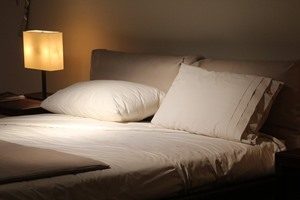As you age, your sleep patterns also change – you tend to get sleepy earlier, and you also wake up earlier than the usual. Although these changes are considered normal part of aging, insomnia and disturbed sleep are not.
The right amount of sleep every night is essential to our health. In fact, studies show a link between either too much or too little sleep and dementia risk.
Even mild sleep deprivation will raise your blood pressure, the silent killer. As mentioned, too much sleep can also be a problem. My personal “sweet spot” is about 7.5 hours per night, but your best sleep duration may differ from mine.
Most sleep disturbances can be overcome with these 9 helpful tips.
1. Establish a bed-time routine.
One of the many perks of being retired is not having a rigid routine, but the downside of this is that it can cause a toll on our sleep patterns. Your responsibilities may not be the same as before but that shouldn’t stop you from maintaining a daily routine. Design a morning and night routine that has a regular bedtime and wake time to promote sleepiness in the evening and alertness during the day. A regular night-time ritual will help get you in the mood for sleep. I have found that one thing to be surprisingly helpful. If I skip my nighttime ritual, I may have to get up after an hour or so of not being able to sleep, and do it anyway. The actual ritual is not really very important, only that you do the same thing every night at bedtime (except: Don’t snack at bedtime! That definitely does not help.)
2. Get some exercise.

3. Practice relaxation techniques.

4. Limit your caffeine intake.

If you are like me (I really like the taste of coffee), just switch to a high-quality decaf after your “quit time.” I go with Swiss water-process organic decaf, because the stuff that is used by most outfits to cheaply decaffeinate coffee gives me really bad headaches.
5. Use the help of sleep gadgets.
Although there are natural sleeping aids that you can take to induce zzz’s, there are also a number of electronic devices that can help you get a better night’s sleep.
From sunset-simulating bedside lamp to smart pillows with built-in sleep motion detector, here are 4 gadgets to help you Get a Better Night’s Sleep.
6. Use essential oils.

7. Reduce blue light exposure in the evening.

Another hint: There are free utilities you can install on your laptop that will turn down the blue at a scheduled time.
8. Make the room really dark

9. Create a restful environment.

My personal favorite is an air mattress, but I found that to be enough hassle (leaks, mostly, which tend to happen at the absolutely most inconvenient times) that I have settled for what I consider to be a really close 2nd, a 14-inch memory-foam mattress, which is surprisingly affordable. The only real down-side to my memory-foam mattress is that I have gotten really spoiled, and when traveling, I have trouble finding a hotel with a bed that is anywhere near as comfortable. OTOH, one of the true joys of getting back home from a trip is getting to sleep in my own bed!










